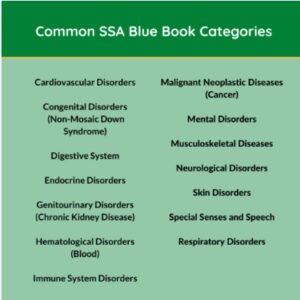The SSA’s 5-step determination process
If you are considering applying for Social Security Disability (SSD) benefits, the main question the (SSA) will ask is: “Do you have a qualifying disability?” The SSA uses a 5-step process to determine if you have a qualifying disability. Let’s review what these steps are:
1. Are you working?

In general, the SSA uses earnings guidelines to evaluate whether your work activity is Substantial Gainful Activity (SGA). If you are working in 2024 and earn over $1,550 ($2,590 if you’re blind) a month, you typically will not be considered to have a disability.
If you are not working or are working but earning less than SGA, your claim will be sent to the Disability Determination Services (DDS) office. This office will decide your medical condition. The DDS uses Steps 2-5 below to make their decision.
2. Is your condition “severe”?
To be considered severe, your condition must significantly limit your ability to do basic work-related activities. This includes lifting, standing, walking, sitting, or remembering – AND it must be for at least 12 months. If it does not, you will be found not to have a qualifying disability.
If your condition does interfere with basic work-related activities, we move on to Step 3.
3. Is your condition found in the list of disabling conditions?

The SSA maintains a list of medical conditions for each major body system that they consider severe enough to prohibit an individual from doing SGA. If you have a condition not on the list, the SSA will need to decide if that condition is as severe as a listed medical condition. If so, you will be found to have a qualifying disability. If it is not, we advance to Step 4.
INITIATIVES TO EXPEDITE NEW CLAIMS
The SSA has 2 initiatives designed to expedite the processing of new disability claims:
Compassionate Allowances : Certain medical conditions usually qualify for disability as soon as the diagnosis is confirmed. Examples include acute leukemia and ALS.
: Certain medical conditions usually qualify for disability as soon as the diagnosis is confirmed. Examples include acute leukemia and ALS.
Quick Disability Determinations: This technology identifies claimants with the most severe disabilities and allows the SSA to expedite their decision on those cases while maintaining accuracy. These two initiatives have significantly decreased the time the SSA takes to make a decision; in some cases, a decision is rendered in a matter of days instead of months.
4. Can you do the work you performed before?
Here, the SSA decides if your medical condition(s) prevent you from performing any of your past work. If it does not, you will be determined not to have a qualifying disability. If it does, we move to the final step, step 5.
5. Can you do any other type of work?
If you are unable to do the same work as you have in the past, the SSA will examine whether there is other work you can do despite your medical conditions.
Many factors are considered when deciding whether a person will receive SSD benefits: your medical conditions, age, education, past work experience, and any transferable skills you may have. If you cannot perform other work, you will receive a favorable decision for disability benefits. If you can do other work, it will be decided you do not have a qualifying disability, and your claim will be denied.
NOW WHAT? THIS IS SO CONFUSING!
Yes, filing for SSD can be a confusing, long, tedious process. There are so many steps involved, and if your claim does not follow the “typical” process, those deviations can be highly stressful and cause even more confusion. If you or someone you know is considering filing for SSD benefits, the best thing you can do is contact the legal team at Parmele Law Firm.
WHY SHOULD I CONTACT PARMELE LAW FIRM?

- Your initial consultation is at no cost. Call us at 1-866-889-2570 to set up your consultation appointment.
- We don’t get paid unless you receive your disability benefits. Yes, you read that correctly. We don’t get paid unless you get paid. What do you have to lose?
Parmele Law Firm. Since 2001, we have helped over 55,000 individuals receive favorable decisions for benefits. Our attorneys have 135+ years of SSD experience. Doesn’t it make sense to call?
Parmele Law Firm. Guiding you with integrity, competency, and experience.
